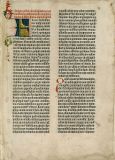17 APRIL 1397
 Geoffrey Chaucer tells the Canterbury Tales for the first time at the court of Richard II.
Geoffrey Chaucer tells the Canterbury Tales for the first time at the court of Richard II.
Tags: Books
Birth of novelist and playwrite Elizabeth MacKintosh in Inverness. One of her pen names was Josephine Tey, and her 1951 novel The Daughter of Time was probably for many the starting point of a fascination with Richard III and the later Middle Ages.
For more information on Elizabeth MacKintosh:
, Josephine Tey: A Life. Sandstone Press, 2015
‘Death of Elizabeth MacKintosh‘, Dottie Tales (13 February 2016)
Tags: Books
 Geoffrey Chaucer tells the Canterbury Tales for the first time at the court of Richard II.
Geoffrey Chaucer tells the Canterbury Tales for the first time at the court of Richard II.
Tags: Books
 Publication of William Caxton’s translation of Aesop’s Fables, printed at his workshop at Westminster.
Publication of William Caxton’s translation of Aesop’s Fables, printed at his workshop at Westminster.
Tags: Books
 Geoffrey of Monmouth was elected to the see of St Asaph in Wales on 24 February 1151. It is assumed that he was born between 1100 and 1110, and died between 25 December 1154 and 24 December 1155.
Geoffrey of Monmouth was elected to the see of St Asaph in Wales on 24 February 1151. It is assumed that he was born between 1100 and 1110, and died between 25 December 1154 and 24 December 1155.
He is mainly known as a writer of the Historia Regum Britanniae (The history of the kings of Britain), which includes stories of Arthur, Merlin and kings Leir and Coel.
Geoffrey will always remind me of my classes in medieval Latin at university, where we studied his story of King Arthur. Though I had disliked Latin at school and only did the course because it was a prerequisite for graduation, here I discovered that studying a ‘dead’ language could actually be fun.
J. C. Crick, ‘Monmouth, Geoffrey of (d. 1154/5)’, Oxford Dictionary of National Biography, Oxford University Press, 2004.
Dorothea Preis
The death of Johannes Gutenberg occurred on 3 February 1468 in Mainz.
Johannes Gensfleisch zur Laden zum Gutenberg, his full name, was born c. 1398 in Mainz. In approx. 1439 he invented a mechanical printing press using moveable type. This was later, in 1476, introduced into England by William Caxton. The invention of the printing press is regarded as one of the most important developments in the history of mankind as it allowed the fast dissemination of written texts.
A fascinating novel about the first printed Bible is Gutenberg’s Apprentice by Alix Christie. You can find a review here.
Tejvan Pettinger, ‘Biography of Johannes Gutenberg’, Biography Online (28 December 2012). URL: http://www.biographyonline.net/business/j-gutenberg.html [last accessed 1 Feb. 2020]
Dorothea Preis
Tags: Books
On 16 December 1775, Jane Austen was born in Steventon, Hampshire, where her Father, George Austen, was rector. We all know and love Jane Austen’s novels, but her History of England, from the Reign of Henry the 4th to the Death of Charles the 1st is less widely known. She wrote this at the age of 16 in 1791, but even at this early age it shows the wit she was to become famous for.
Of particular interest to us is of course what she had to say about Richard III. Jane acknowledges that his character has been badly treated by historians, however, she is “inclined to suppose him a very respectable Man”. The reason for her positive impression is that “he was York”, so not too many Lancastrian sympathies there.
Quotes taken from:
Jane Austen: Love and Freindship and other early Works, The Women’s Press, London, 1978, reprinted 1979. ISBN 0 7043 3823 8, p.71
You can read a short biography here.
Dorothea Preis
Tags: Books, Richard III
 Margaret of York, Duchess of Burgundy, dies at Malines. She was a sister of Edward IV and Richard III. After Richard’s death she supported the Yorkist pretenders. She was on very good terms with her husband’s daughter and her family and had a successful and positive influence on Burgundian politics. She was a patron of William Caxton, who introduced the printing press to England.
Margaret of York, Duchess of Burgundy, dies at Malines. She was a sister of Edward IV and Richard III. After Richard’s death she supported the Yorkist pretenders. She was on very good terms with her husband’s daughter and her family and had a successful and positive influence on Burgundian politics. She was a patron of William Caxton, who introduced the printing press to England.
Tags: Books, Margaret of Burgundy
 William Caxton produces Dictes or Sayengis of the Philosophres, one of the first books printed on a printing press in England.
William Caxton produces Dictes or Sayengis of the Philosophres, one of the first books printed on a printing press in England.
Tags: Books
 The first Gutenberg Bible is printed.
The first Gutenberg Bible is printed.
Tags: Books
King Richard III’s remains were reinterred in Leicester Cathedral in a dignified and moving service on 26 March 2015. The service was conducted in the presence of the Most Revd Justin Welby, Archbishop of Canterbury.
The order of the service was designed in cooperation with Dr Alexandra Buckle. Dr Buckle had found a manuscript, which contains details of a medieval service for the reburial of the human remains of a noble person. She was researching Richard Beauchamp, Earl of Warwick, who was reburied in Richard’s presence in 1475. This document served as a basis for Richard III’s reinterment service.
During the service, Richard was also reunited with his Book of Hours, about which I had written on another site, though before Richard’s reinterment.
On the following day, 27 March, Richard III’s tomb was revealed during a service. Together with several friends, I had in the opportunity on that Friday afternoon, to see the tomb in all its glory. For me, the floor tiles with inlaid Yorkist roses were a nice touch.
Together with many, many other Ricardians, I was able to spend the Reinterment Week in Leicester, a profound and exhilarating experience. The week started for me by watching the cortege passing at Jubilee Square. On Monday, 23 March, Memorial Service for members of the Richard III Society was held in Leicester Cathedral. I had been lucky in the ballot and received an invitation to this beautiful service. From where I was seated my view of the proceedings was obscured, but I had a clear view of the reason for the service, the coffin of Richard III. It was covered with a beautifully embroidered pall, on the one side displaying figures from the 15th century and on the other side figures involved in the 21st-century discovery of the King’s remains.
The Choir sang In Memoriam: Ricardus Rex by Graham Keitch. Many of us remember this from the 2013 Australasian Convention in Sydney, where we were able to play it by permission of the composer. There can be no doubt though that to listen to it in a church sung by an outstanding choir beats a recording played over a loudspeaker system.
We all would have liked to attend the actual reinterment service in the Cathedral, but space did not allow that. However, along with several of our branch members from NSW, I was able to watch the service on TV live at our hotel in Leicester. The most memorable part for me was a natural phenomenon: It was an overcast grey and drizzly morning, but at the exact moment, when Richard’s coffin was lowered into the ground, the sun broke through. His troubled afterlife had finally come to rest.
It should also be mentioned that the NSW Branch of the Richard III Society made a donation to Leicester Cathedral to help cover the costs of the reinterment. This was received by Revd Peter Hobson with thanks to all members of the NSW Branch in the name of Leicester Cathedral.
Tags: Books, Leicester, Leicester Cathedral, Richard III Reinterment, Richard III Society